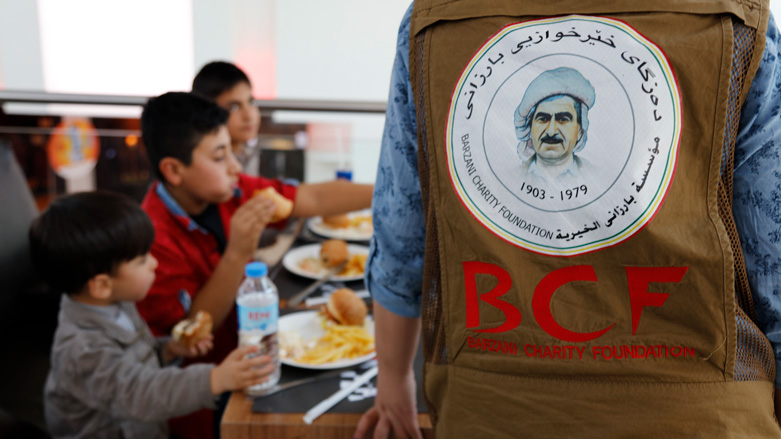Barzani Charity Foundation supports IDPs, refugees, school children

WASHINGTON DC (Kurdistan 24) - The Barzani Charity Foundation was founded some fourteen years ago, by the current Prime Minister of the Kurdistan Region, Masrour Barzani, as Delovan Barwari, the charity’s US representative explained.
The passage of time, if anything, has made the foundation more important now than in 2005, when it was first established—just two years after the start of the US-led war to oust Saddam Hussein and his regime. At the time, the Bush administration believed it had defeated the Baathist regime, and Iraq would emerge as a democratic model for the rest of the Middle East.
Sadly, that was not to be. Conflict and strife have characterized the years since, the latest phase being the fight against the so-called Islamic State. The Barzani Charity Foundation (BCF) is playing a crucial role in helping to address the humanitarian needs of the many people displaced and uprooted by the conflict.
The BCF operates 11 camps: seven for Internally Displaced Persons (IDP), Iraqis who have fled the Islamic State, and another four camps for refugees from Syria.
“We manage everything inside the camps,” Barwari explained, “from the clinics to social and educational centers,” including vocational centers. In total, there are about 20 such centers for camp residents.
Another BSF project is dedicated to caring for those children who have lost parents. “We support more than 20,000 orphans,” Barwari said.
In the Middle East, including the Kurdistan Region, orphans are generally kept within the extended family and raised by relatives. The BCF provides financial assistance to those caregivers.
The charity also addresses the needs of the handicapped. “We support more than 1,000 disabled people,” he said, providing “wheelchairs and other equipment to make their lives better.”
However, “one of my favorite projects,” Barwari continued, “is what I call the back-to-school program.”
“Every year, throughout the year, we provide 45,000 backpacks,” full of school supplies, to elementary school students, he explained. The supplies are provided to children “throughout the Kurdistan Region and even in the disputed areas.”
But “one of our greatest skills and experiences” is in “providing aid to disaster areas. That was the main reason why the Barzani Charity Foundation was founded,” he said. “Whenever there is a disaster,” the BCF “is usually the first to be there.”
Barwari stressed that all this charitable activity is made possible through the support that the BCF, itself, receives from its donors and sponsors.
Asked about the current humanitarian situation in Iraq, he offered a grim picture, describing it as “still a dire situation.”
“At the height of the conflict” with the Islamic State, some six million people were displaced, he explained. “That number has dwindled down to 1.8 million” at present. “But the rate of return has leveled out in recent months,” because of the “upsurge in terrorist activities by ISIS and some of the rogue militia groups that belong to the Popular Mobilization Forces, the Hashd al-Shaabi.” They have created “insecurity in some of the disputed areas and in the Sunni regions.”
Currently, the Kurdistan Region hosts over one million IDPs and refugees. Of that total, 765,000 are IDPs, and the largest plurality—about 40%—are Sunni Arabs. Some 30% are Yezidis, Barwari continued, “about 13% are Kurds, 7% are Christians, and the rest—about 10%—are Turkmens and other minorities.”
Of the 275,000 refugees in the Kurdistan Region, the overwhelming majority—250,000—are Syrians, but “we also have thousands of Kurds from Turkey and Kurds from Iranian Kurdistan” as well.
In Iraq as a whole, there is a “huge gap” between the humanitarian needs and the funding available to address them. A 2018 assessment, conducted by the Iraqi government and analyzed by the World Bank, estimated it would take over 10 years to rebuild Iraq and cost some $88 billion, Barwari explained.
But “more than two years have passed since ISIS was territorially defeated, and Mosul, Sinjar, and most of the disputed areas in the Nineveh Plains are still destroyed,” he continued.
“So I would say that ten years is a conservative figure. It will probably take a lot longer” to rebuild those areas. “There was a donor conference in 2018 in Kuwait,” he said. Some “$30 billion was pledged to Iraq, but not much of that has materialized.”
“Many of the international organizations have discontinued their programs,” Barwari explained, “and that has obviously affected the livelihoods of the IDPs and refugees, and the host communities as well.”

Asked about the situation in Sinjar, he noted that this was the fifth anniversary of the Yezidi genocide, which was carried out by the so-called Islamic State and which sparked an exodus of over one million people to the Kurdistan Region.
The situation in Sinjar is “very bad,” and “most of the Yezidis there are living in poor conditions”—in terms of infrastructure, which remains seriously damaged, as well as their financial situation.
“Employment and low wages, both, are a huge problem,” while children lack access to education, Barwari said. In addition, many people suffer psychological trauma from the terrible brutalities inflicted on them by the terrorist organization.
Amb. Sam Brownback, US Ambassador at Large for International Religious Freedom, recently offered a similar picture, stressing the need for better security.
Read More: US Envoy hails religious tolerance of Kurds, stresses need for Peshmerga, ISF security coordination
“The United States has put over $300 million” into the Nineveh Plain region, and others have contributed funds as well, including the Hungarian and Polish governments, along with private sector groups, Brownback told Kurdistan 24.
“But it won’t be sustainable in the long term or grow, until the security issue is dealt with,” he continued. “And that’s the one we’re still lacking—a robust security answer to the problem.”
Editing by John J. Catherine
